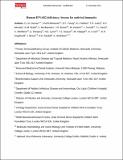Human IFNAR2 deficiency : lessons for antiviral immunity
Abstract
Type I interferon (IFN-α/β) is a fundamental antiviral defense mechanism. Mouse models have been pivotal to understanding the role of IFN-α/β in immunity, although validation of these findings in humans has been limited. We investigated a previously healthy child with fatal encephalitis after inoculation of the live attenuated measles, mumps, and rubella (MMR) vaccine. By targeted resequencing, we identified a homozygous mutation in the high-affinity IFN-α/β receptor (IFNAR2) in the proband, as well as a newborn sibling, that rendered cells unresponsive to IFN-α/β. Reconstitution of the proband's cells with wild-type IFNAR2 restored IFN-α/β responsiveness and control of IFN-attenuated viruses. Despite the severe outcome of systemic live vaccine challenge, the proband had previously shown no evidence of heightened susceptibility to respiratory viral pathogens. The phenotype of IFNAR2 deficiency, together with similar findings in STAT2-deficient patients, supports an essential but narrow role for IFN-α/β in human antiviral immunity.
Citation
Duncan , C J A , Mohamad , S M B , Young , D F , Skelton , A J , Leahy , T R , Munday , D C , Butler , K M , Morfopoulou , S , Brown , J R , Hubank , M , Connell , J , Gavin , P J , McMahon , C , Dempsey , E , Lynch , N E , Jacques , T S , Valappil , M , Cant , A J , Breuer , J , Engelhardt , K R , Randall , R E & Hambleton , S 2015 , ' Human IFNAR2 deficiency : lessons for antiviral immunity ' , Science Translational Medicine , vol. 7 , no. 307 , 307ra154 . https://doi.org/10.1126/scitranslmed.aac4227
Publication
Science Translational Medicine
Status
Peer reviewed
ISSN
1946-6234Type
Journal article
Description
C.J.A.D. was supported by the Academy of Medical Sciences (AMS-SGCL11), the British Infection Association, and the UK NIH Research (NIHR); S.M.B.M. was supported by the Universiti Sains Malaysia Fellowship; K.R.E. and S.H. were supported by the Sir Jules Thorn Trust (12/JTA); D.F.Y., D.C.M., and R.E.R. were supported by the Wellcome Trust (101788/Z/13/Z); and A.J.S. was supported by the Medical Research Council–Arthritis Research UK Centre for Integrated Research into Musculoskeletal Ageing and NIHR Newcastle Biomedical Research Centre. J.B. receives funding from the UCLH/UCL NIHR Biomedical Research Centre. S.M. is supported by the FP7 PATHSEEK grant. J.R.B. is supported by an NIHR fellowship.Collections
Items in the St Andrews Research Repository are protected by copyright, with all rights reserved, unless otherwise indicated.

